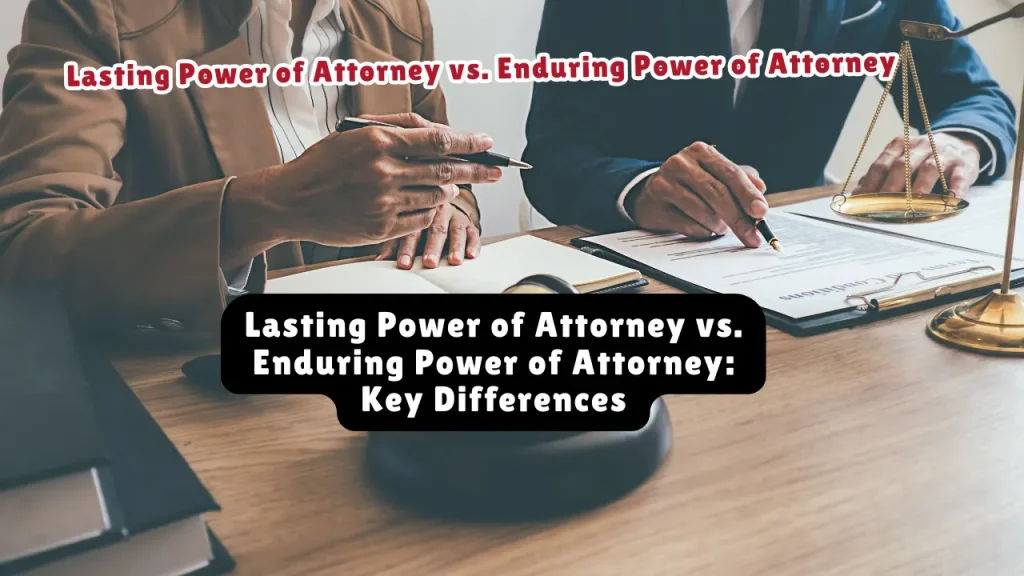Lasting Power of Attorney vs. Enduring Power of Attorney: Key Differences
A Lasting Power of Attorney (LPA) and Enduring Power of Attorney (EPA) both allow someone to manage your affairs if you lose mental capacity. However, LPAs (used in England and Wales) are more comprehensive and modern, covering health decisions and requiring registration upfront. EPAs, now outdated in most cases, only apply to finances and lack safeguards against abuse.
Table of Contents
What Is an Enduring Power of Attorney (EPA)?
Introduced in 1985, an EPA lets you appoint someone to manage property and finances if you become mentally incapable. Key features:
- Limited scope: Cannot make health or care decisions.
- No upfront registration: The agent registers it only once you lose capacity.
- Grandfathered validity: EPAs created before October 2007 are still legal in England and Wales, but no new ones can be made.
Example: An EPA from 2005 allowed an agent to pay bills for a dementia patient but couldn’t decide on their medical treatment.
What Is a Lasting Power of Attorney (LPA)?
LPAs replaced EPAs in England and Wales in 2007 under the Mental Capacity Act 2005. They come in two types:
- Property and Financial Affairs LPA: Manages bank accounts, bills, and property.
- Health and Welfare LPA: Covers medical care, daily routines, and end-of-life decisions.
Key features:
- Must be registered upfront with the Office of the Public Guardian (OPG) before use.
- Stricter safeguards: Requires a certificate provider (e.g., a doctor or lawyer) to confirm you understand the document.
- Flexibility: You can restrict your agent’s powers (e.g., “can’t sell my home without court approval”).
Related article:
Can Someone Act as a Power of Attorney for a Trust?

5 Critical Differences Between LPAs and EPAs
| Factor | Enduring Power of Attorney (EPA) | Lasting Power of Attorney (LPA) |
| Scope | Covers finances only. | Covers finances and health decisions. |
| Registration | Registered only after incapacity. | Must be registered before it can be used. |
| Legal Safeguards | Minimal oversight; higher fraud risk. | Requires a certificate provider and witnesses. |
| Geographic Validity | Valid only in England/Wales (pre-2007). | Recognized in England/Wales; some UK regions have similar systems. |
| Updates | Cannot be modified; must create a new LPA. | Can be updated if you still have mental capacity. |
Why LPAs Replaced EPAs
EPAs were phased out due to gaps in protecting vulnerable people. LPAs address these flaws by:
- Including healthcare authority.
- Requiring upfront registration to prevent agents from acting without oversight.
- Allowing donors to set preferences (e.g., “I refuse blood transfusions”).
Quote from a Legal Expert:
“EPAs left too much room for abuse. LPAs give donors more control and ensure agents act in their best interests.”
— Sarah Lewis, Solicitor at UK Law Group (Cited in The Guardian, 2022).
Real-Life Consequences of Using an Outdated EPA
In 2019, a Welsh family discovered their father’s EPA (created in 2003) didn’t cover his dementia care decisions. Agents couldn’t move him to a care home without court intervention, costing £5,000 in legal fees. The court advised transitioning to an LPA for future clarity.
Should You Replace an EPA with an LPA?
If you have an EPA, it’s still valid—but consider upgrading to an LPA for:
- Healthcare control: Let your agent make medical decisions.
- Avoiding delays: LPAs are ready to use immediately if you lose capacity.
- Modern protections: Reduced risk of disputes or fraud.
Steps to upgrade:
- Create a new LPA (while you still have mental capacity).
- Notify your EPA agent(s) and revoke the EPA in writing.
- Register the LPA with the OPG (£82 per document).
Government Resources
- Office of the Public Guardian (OPG): Create an LPA online
- Citizens Advice: How to revoke an EPA
- Age UK: Free guides on choosing an attorney.
Key Takeaways
- EPAs are outdated and limited to finances; LPAs cover health and finances with better safeguards.
- LPAs require upfront registration, while EPAs do not.
- Replace old EPAs with LPAs to ensure full protection.
Bottom Line
If you’re in England or Wales, an LPA is the safer, more flexible choice. For those in Scotland or Northern Ireland, similar systems exist (e.g., Continuing Power of Attorney in Scotland). Always consult a solicitor to avoid gaps in your planning.
About the Author

Sarah Klein, JD, is a licensed attorney and legal content strategist with over 12 years of experience across civil, criminal, family, and regulatory law. At All About Lawyer, she covers a wide range of legal topics — from high-profile lawsuits and courtroom stories to state traffic laws and everyday legal questions — all with a focus on accuracy, clarity, and public understanding.
Her writing blends real legal insight with plain-English explanations, helping readers stay informed and legally aware.
Read more about Sarah
